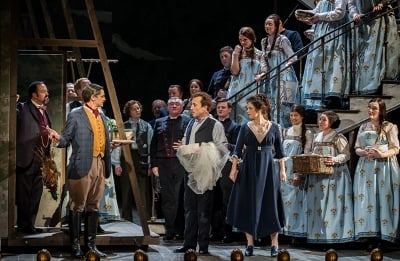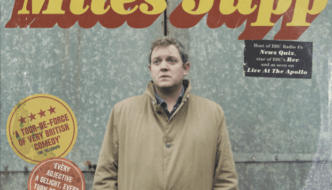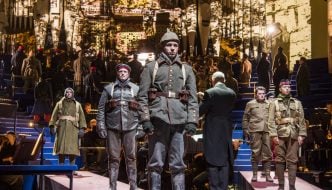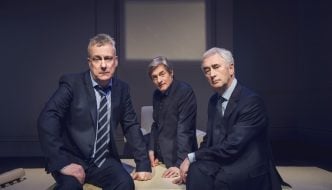Review: Opera North’s ‘The Marriage of Figaro’ at Leeds Grand Theatre

Image Credits: © CLIVE BARDA/ ArenaPAL, courtesy of Opera North
Of all the operas on which Mozart and Da Ponte collaborated, Le nozze di Figaro (The Marriage of Figaro in this English language production) is perhaps the one most fixed in its original setting; this tale of social and sexual politics in eighteenth century Seville doesn’t translate comfortably to as many settings or time periods as, say, Don Giovanni. For this production, Jo Davies sets the action in the early twentieth century, though you would be forgiven for not realising the country is Russia until Don Curzio, here an orthodox priest, arrives in act three. This is a very effective choice; the usurping of the master by his servants making a subtle parallel to the political upheaval that must surely be imminent. Signs of disrepair in the Almaviva household also allude to this, but again subtly.
For this is an evening about human relationships, not political statements.
The characters and their relation-ships are beautifully drawn; particularly that between the Countess and Cherubino. Their flirtations are given more weight and seriousness than one often sees; foreshadowing Beaumarchais’ final play ‘La mere coupa-ble’, in which the Countess has a child by Cherubino, before he leaves to die gloriously in battle, as Figaro predicts in ‘Non Piu Andrai’. Susanna and the Countess’ relationship is also well drawn, the Countess never losing her poise while conspiring with her servants.
The production treads a fine line between comedy and farce, and sometimes slips into the latter category; Helen Sherman’s Cherubino is forced to perform some extraordinary contortions on the Countess’ bed dur-ing ‘Voi Che Sapete’, which seem forced and silly in the context. Another misstep is the angling of the crucial chair in act one, facing upstage, meaning that some moments fall slightly flat as we don’t get to see Cherubino’s reaction to being discovered, and characters who sit in the chair are forced to contort themselves in order to be heard. But these are relatively minor gripes in an evening full of joy, humour and sincerity.

Musically, there isn’t a weak link. Richard Burkhard makes an extremely likeable Figaro, singing elegantly, and bringing a certain airiness to the character that reminds us this is the same character as the ever re-sourceful barber in ‘Il Barbiere di Siviglia’. Quirijn de Lang as the Count makes the most of his opportunities to be dastardly, delivering a fine rendition of his act three aria. If his voice is a little on the light side for the part, he makes up for it with his fine acting. Helen Sherman makes a highly convincing Cherubino, both in her teenage boy mannerisms, and her beautifully nuanced singing. All the smaller roles are also well taken, Gaynor Keeble having enormous fun with Marcellina, while still developing her character from insufferable harridan in acts one and two, to loving and supportive mother in acts three and four. Joseph Shovelton as Don Basilio, and Jeremy Parker as Antonio each make marvellous comedic turns; Antonio’s transformation into a Yorkshire gardener draws many laughs, and the role is short enough for the joke to not wear thin. Ellie Laugharne’s charming Barbarina is definitely one to watch, especially after her portrayal of the Governess for Opera Holland Park last year.

But the two main catalysts of the drama, especially in this production, are Susanna and the Countess, and both are well cast here. Silvia Moi’s Susanna sometimes comes across overly perky, but she is always ap-pealing, and sings with gossamer purity, making an effective contrast to Ana Maria Labin’s more opulent Countess. In such a fine cast it seems almost unfair to pick a standout, but Labin’s Countess is so beautifully vocalised, while retaining a developed sense of character; we fully believe in her friendly relationships with her servants, yet she retains the dignity and grace Mozart gave her. ‘Dove Sono’ is the apex of her interpretation; she develops the Countess’ emotional conflict as she laments the Count’s lost love for her, expresses her shame at being forced to plot with servants, and hopes that he will love her again, beautifully sung and touchingly delivered.
Alexander Shelly and the Opera North orchestra create a wonderfully transparent sound, bringing out the wind section in particular, and creating suitable Mozartian elegance. He keeps the pace moving along nicely. The evening never drags, yet he still allows time to stop still when it should; the reconciliation between the Count and Countess is as affecting as it should be. It should also be noted that this production is sung in English, Jeremy Sams’ excellent translation faultlessly delivered by the (international) cast, the lack of surti-tles ensuring the audience listens closely to the singers, creating a far greater sense of involvement in the drama.
The Marriage of Figaro is a highly enjoyable evening, with high musical values, that is both touching and funny. Ideal for opera buffs and beginners alike.
The Marriage of Figaro is showing at Leeds Grand Theatre between the 24 Jan- 27 February 2015. For more information visit Opera North’s website.




Comments